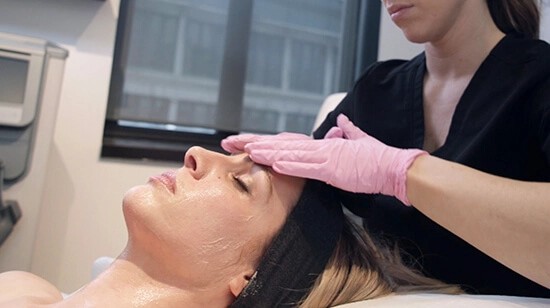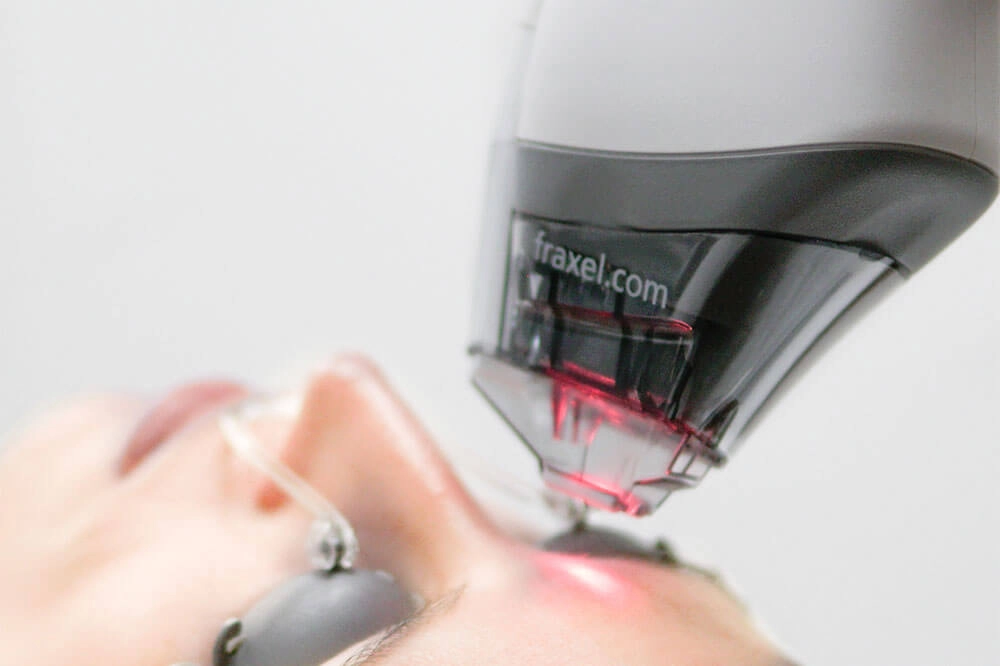
For close to 20 years, fractional laser resurfacing has been a fundamental treatment in the field of aesthetic medicine that helps improve a variety of skin problems related to texture, spots and fine lines. The lasers are based on the principle of creating deep micro ablation zones in the skin (multiple microscopic perforations in the dermis) while leaving the surrounding skin intact in order to stimulate the natural skin healing process.
These reliable, highly accurate lasers eliminate old or damaged skin cells to reveal new, radiant-looking skin while reducing the appearance of acne scars, stretchmarks, age spots and freckles.
There are two categories of fractional lasers that deliver energy at various strengths (measured in joules), wavelengths (measured in nanometers) and warm-up time (measured in milliseconds). This “adaptability” presents a considerable advantage; the parameters can be set according to the extent of the damaged skin to be treated, as well as the patient’s skin type.
ABLATIVE FRACTIONAL LASERS
Ablative-type fractional lasers break the skin barrier and reach the dermis with wavelengths that oscillate between 2,940 and 10,600 nanometers at the more intensive end. They can cover 15 to 22% of the skin surface and are considered more aggressive—they can sometimes disrupt a patient’s social life for up to 15 days. These lasers are adept at treating thicker skin or deep acne scars and are well suited for smoothing wrinkled or rugged surfaces.
At Dermapure, we prioritize CO2 and ProFractional lasers. Specific care protocols have been clearly established to maximize results and minimize discomfort while ensuring complete safety. Only our qualified medical staff is allowed to use these technologies.
NON-ABLATIVE FRACTIONAL LASERS
Non-ablative fractional lasers use less energy and cover less area, and produce shorter wavelengths that range from 1,440 to 1,927 nanometers. They don’t break the skin barrier and, as such, do not pose an elevated risk of hyperpigmentation. In addition, they do not interfere with a patient’s social life. However, these fractional lasers, while very gentle, are highly effective and product remarkable results in terms of overall skin tone and pore tightening. The technologies available at our clinics—Fraxel, Clear + Brilliant™ and Venus Viva™—are perfect for treating both normal and thin skin types.
HYBRID LASERS
Hybrid lasers such as the Halo™ , combine non-ablative laser technology with ablative laser technology. They make it possible to create controlled coagulation zones at strictly targeted skin depths. This technology, available in some of our clinics, stimulates the production of new collagen and improves the complexion, firmness and texture of the skin. In addition, this type of laser is ideal for treating normal and sensitive skin.
FRACTIONAL RADIOFREQUENCY
Rather than relying on laser energy, the EndyMed FSR treatment is based on the innovative use of fractional radiofrequency to stimulate collagen and elastin production. Offering the most effective depth penetration on the market (2.9 mm) and a gentle sweeping technology, EndyMed FSR has the benefit of keeping the skin upper layer undamaged significantly reducing recovery time. This treatment tightens skin texture, brightens, and evens skin tone, reduces pores, and improves skin texture and the appearance of wrinkles and acne scars. It’s safe and effective and suitable for all skin types.
*Complimentary consultations are offered by specialist skin care consultants.
Fractional lasers offer a cutting-edge solution for revealing radiant skin and reducing stretch marks, acne scars, age spots, and freckles. Grounded in our commitment to enhancing natural beauty, our team of experienced physicians, nurses and skin experts tailors each fractional laser treatment to your unique circumstances.
Outcomes can vary for each patient. Images provided are illustrative only and do not guarantee specific results.
Desensitizing the skin with a lidocaine-based anesthetic gel will reduce discomfort felt during treatment. This product is applied to and left on clean skin for approximately 1 hour before treatment to temporarily desensitize the treatment area.
Carefully removing all traces of gel, makeup and lipid film is an essential first step in your fractional laser treatment. It is also important to properly disinfect the skin using alcohol to create a suitable sterile surface before the start of the procedure.
Depending on the technology used, protective eyewear may be required to properly protect your eyes from possible light emissions. Your eye protection ensures complete safety at all times.
Determining the specific parameters for the treatment will ensure its success. Since each individual is unique, each condition must be treated differently depending on the area to be treated, the surface and outline of blemishes to be corrected, and skin type. Staff should consider several factors that are unique to you and that may change over time. Deep acne scars or stretchmarks will probably require more work than a simple pass over superficial freckles. The good news is that once your skin has regenerated, the results will remain with you for the rest of your life.
Feeling the applicator tip sliding over your skin can be relatively uncomfortable. By their very nature, fractional lasers are reasonably invasive treatments that sometimes cause a strong heat/burning sensation. Depending on the technology used, several passes may—or may not—be required on the same area and, given the depths attained in some cases, bleeding may also occur (especially during CO2 and ProFractional lasers). The session rarely exceeds 60 minutes and our experienced medical and technical personnel make every effort to minimize discomfort and accompany you throughout the treatment.
Applying a specific cream immediately after the treatment is not always necessary; each technology requires different follow-up and post-treatment procedures that are carefully explained to the patient by our medical and technical team. These recommendations must be strictly followed to allow the skin to recover properly. Swelling, redness, and sometimes even bleeding can be expected during the first 48 hours; these symptoms decrease significantly in 5 to 10 days. Normal skin flaking/peeling occurs at the end of recovery and it is imperative that you avoid sunlight, makeup and all scented products until your skin has fully healed.
Prices vary according to body area targeted and the type of technology used.
Contact your clinic for all details.

It normally takes 2 to 5 sessions at a minimum one-month interval to achieve optimal results, depending on the initial condition of your skin. However, it is strongly recommended to maintain the overall health of the epidermis using glycolic peels occasionally, or as part of a course of treatment, based on your technician’s recommendations. Skin treated by fractional laser is not exempt from the natural aging process! Other parts of the body can benefit from Venus Freeze sessions.
Pregnant or breastfeeding women should delay this type of treatment. Some treatments for severe acne – received within the last 6 months – may also be a contraindication.
For both men and women, the face is unquestionably the most popular treatment area for fractional laser. It is, after all, one of the body’s most exposed areas and is conducive to irregular pigmentation and texture. Full or partial face treatments are possible, with the latter option being especially effective on acne scars that are concentrated on the cheeks and forehead. Treatments can also be performed on various body areas. Non-ablative lasers are ideal for the treatment of stretchmarks on the stomach and thighs, for pigment spots on the hands, and for loose, sagging skin on the décolleté. It is important to consult with our team prior to treatment to openly discuss your goals and expectations. It is equally important to assess the various treatment options, the number of sessions required, and the benefits and risks associated with each procedure.

Shop our products for an enhanced beauty routine!
Visit The Online StoreFractional laser resurfacing is an advanced aesthetic treatment aimed at improving skin texture, spots, and fine lines. It involves using lasers to create micro-ablation zones in the skin, leaving surrounding skin intact. By doing so, it triggers the body’s natural healing mechanisms, encouraging collagen synthesis and revitalizing the skin.
Fractional lasers are categorized into two types: ablative and non-ablative. There is also a third category, which combines ablative and non-ablative into a hybrid laser. Ablative lasers, such as CO2 and ProFractional, break the skin barrier, reaching the dermis with wavelengths from 2,940 to 10,600 nanometers. They cover 15 to 22% of the skin surface and are more aggressive—suitable for thicker skin or deep acne scars. Ablative lasers are suited to patients with light, light and medium light skin types, or phototypes I to III. Non-ablative lasers, like Fraxel and Clear + Brilliant™, use less energy and shorter wavelengths (1,440 to 1,927 nanometers), making them gentler and suitable for overall skin tone improvement and for all phototypes. These lasers can be adapted based on the extent of damage and the patient's skin type, ensuring optimal treatment outcomes. Hybrid lasers treat both the dermis and epidermis within the same treatment, improving the appearance of wrinkles and scars, as well as skin texture and dilated pores. While these lasers can be used on normal and thin skin, including phototypes I to III, extra precaution and care are taken to treat high phototypes (IV to VI) to reduce the likelihood of depigmentation.
Fractional laser treatment effectively targets various skin concerns, including acne scars, stretch marks, age spots, and freckles. By creating micro-ablation zones in the skin, lasers stimulate collagen production and skin renewal, reducing the appearance of scars and marks.
Fractional lasers can treat various body areas. Full or partial face treatments are popular, especially for concentrated concerns like acne scars on the cheeks and forehead. Additionally, non-ablative lasers are suitable for stretch marks on the stomach and thighs, pigment spots on the hands, and loose skin on the décolleté. A consultation with Dermapure’s experienced physicians is crucial so we can discuss goals, assess treatment options, determine the number of sessions required, and understand associated benefits and risks. This ensures personalized treatment plans tailored to individual needs and expectations.
Ablative fractional lasers are advanced skincare tools utilizing wavelengths ranging from 2,940 to 10,600 nanometers. These lasers create micro-ablation zones in the skin, breaking the skin barrier to reach the dermis. They cover 15 to 22% of the skin surface and are well-suited for treating thicker skin or deep acne scars and smoothing wrinkles and rugged surfaces.
Capri Centre, 288 – 1835, Gordon Drive, Kelowna, BC, V1Y 3H5
PHONE
236 420-2888
Monday
09:00 TO 05:00
Tuesday
09:00 TO 05:00
Wednesday
09:00 TO 05:00
Thursday
09:00 TO 07:00
Friday
09:00 TO 05:00
Saturday
CLOSED
Sunday
CLOSED